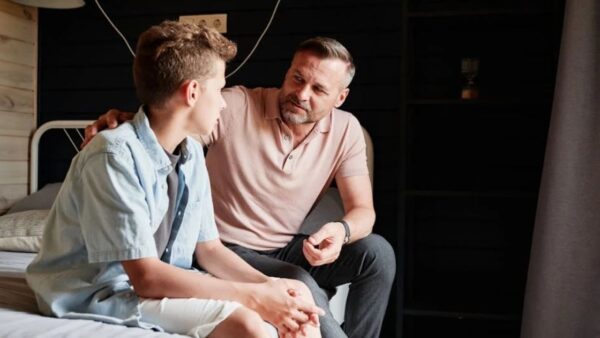Parents & Caregivers
Watching your child struggle with their mental health can be overwhelming, confusing, and even scary. As a parent or caregiver, you want to help, but you might not always know where to start. The most important thing to remember is this: you are not alone, and your support makes a difference.

It All Starts At Home
Teens and young adults don’t dislike adults as much as you might think. In fact, studies show that teens and young adults who have trusted adults in their life can really make a difference when it comes to preventing suicide. A good support system that includes grown-ups they can turn to have a lower risk of suicide.
Let Them Know How Much You Care
- Be open-minded: Let them share their thoughts and feelings without fear of criticism. Stay curious and supportive.
- Hold the judgment: Avoid reacting with shock, frustration, or dismissal. Instead, reassure them that their feelings are valid.
- Let them talk freely: Give them space to express themselves in their own way, at their own pace. Don’t rush or pressure them.
- Listen well: Focus on understanding, not fixing. Sometimes, simply being heard is the most powerful support you can give.

Keep Their Homelife Calm
How to Talk About Suicide
Although it is a difficult conversation to have with your kids, research shows that bringing up the subject of suicide does not put the thought into your child’s head. In fact, it helps to open the door with them and create a safe space for them to release their burdens, lessening their risk of making the attempt. Doctors say it is important to approach the subject differently depending on the child’s age. Here are some tips from parenting experts as to how you can approach the subject:
Preschool-Kindergarten
Keep it simple. Children at this age don’t fully understand, and cognitively are not ready for such a deep conversation.
Conversation example: “That person died, and it is really sad.”
Age 7-10
Give short but truthful answers. It’s important for this age to understand that death is sad and the person died from a disease. Be sure to follow your child’s lead during this conversation. Allow them to ask follow up questions. This helps you not give too much information and overwhelm your child.
Age 11-14
Be clear and concrete. Parenting experts say 1 in 3 children have experienced mood dysregulation that scares them by this age. Gather information they have so you can correct anything that is wrong. Be sure to ask your child if they have ever thought about suicide.
Conversation example: “What have you heard about suicide?”
High School Students
Be observant. At this age mental health conditions are very common. Reassure them that these conditions are normal and they should reach out for help. You can have the same conversation as you would with middle schoolers but replace “if” with “when”.
Conversation example: “What are you going to do when you see your friend struggling?”
College Students
Check in often. If your child tells you that they are “ok” or “fine” encourage them to expand on it some more, it helps to show them that even though you are not physically there you are still around to listen and help. Let them know they are not alone.
Conversation example: “Is there anything I can do to support you?”



